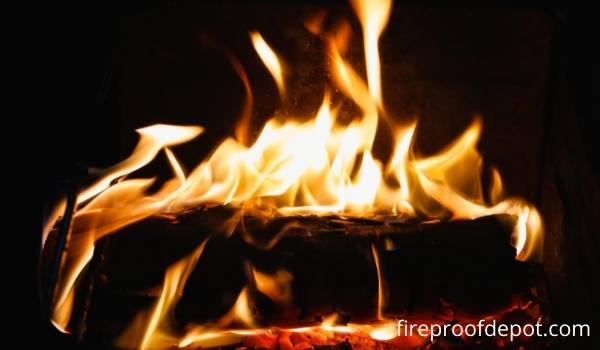Kitchen and cooking oils go hand in hand. How will you cook your food without cooking oil? There is no way you are going to do that unless on a special diet. Okay, I will not digress; but will talk about the hazards of cooking oil in the kitchen in this post. More specifically, it is the canola oil that interests and yes, I am discussing that here.
So, the question- is canola oil flammable may only make sense. You will come across a lot of talk about other oils, but Canola hardly makes it to the headline. Yes, canola oil is flammable.
All cooking oils are flammable and you can only get them heated to a certain point for cooking. If you go beyond that they will burn and catch fire. The same goes for canola oil too as it is no exception to this. I have answered everything you may have on your mind regarding this oil in this post. Just read it.
Is Vegetable Oil Canola Oil?

Canola oil is derived from canola seeds. The seeds are crushed, the oil is pressed, and extracted from it. This oil is high in monounsaturated fat; but low in saturated fat. This is why it is considered to be good for heart health and can also help to keep cholesterol levels under control.
It has a neutral flavor and that is the sole reason why most people prefer cooking in it. Nonetheless, I have to break this news to you that canola oil is made from genetically modified canola crops or GMOs. Argumentatively, this is done to increase the oil quality and this certainly does not make it an unhealthy option.
Undoubtedly, there is some debate over this as people with sensitivities may find it difficult to use. Again, this is not about GMO and canola oil is good or bad, the point is, you get to see it in fine print and can take a call accordingly.
Vegetable oil, on the other hand, is an inexpensive alternative to this. Like canola oil, it also has a neutral flavor and this is the sole reason why it is a popular sight in the kitchen across the world. You get a variety of them to choose from, like sunflower, soybean, rice bran, safflower oils are a few examples.
Although, there is one thing that you may not know about these generic oils is how they are pressed. You may not know what they contain and how the plants were grown. That is there and you have to put up with it.
Is Canola Oil Highly Flammable?
All cooking oils are flammable and canola corresponds to it as well. In simple words, canola oil is flammable and you must be careful while using it. Oils may have varied smoke and flashpoints, but they all are eventually flammable.
Most oils have flashpoints within 600°F or 315°C on average. Yes, you must look-up the flashpoint of the oil you are using for safety reasons. This will assist you to handle it with care.
Can Canola Oil Explode?
Canola oil does not explode provided it is kept in a well-ventilated place. However, if things are not kept safely then it may add to the explosion. For example, if you are cooking in a place that has gas cylinders or combustible substances lying around, then it can end in a catastrophe.
Therefore, we deduce that cooking with safety precautions matters a lot. You need to pay attention to how you handle oil and fire on the whole.
Also Read: Check out our other article about Does Olive Oil Catch On Fire?
At What Temperature Does Canola Oil Catch Fire?
It is true that cooking oil gives off fumes that are flammable. It is inflammable and if it gets in direct contact with fire it will ignite for sure. Likewise, canola oil also shares this property and it has a smoke point of 410°F or 210°C. So, it has to be beyond this temperature that canola oil will catch fire. To be precise the fire point of refined canola oil is 700° F or 371° C.
Hence, you need to ensure that you cook in a ventilated area. You must also make sure that there are no combustible components around you while cooking.

What Is The Flashpoint Of Canola Oil?
To be precise, the flashpoints of refined canola oil are 600°F or 315°C. At this temperature, you will notice little flames moving around it. This should raise an alarm and you must be able to contain the fire pretty quickly (if any).
This is rather a very high flashpoint and you need to worry much about it. Yes, but must work in a secure way to make certain that everything remains under control.
Does Vegetable Oil Catch Fire?
The flashpoints of vegetable oil is 600°F or 315°C and this makes it a highly hazardous liquid. Most cooking oils have different flashpoints. If truth be told, then I have to tell you that vegetables will catch fire.
Technically speaking, it is combustible and is responsible for 49% of household fires. If you are looking for a warning sign, then it has to be the smoke point. The moment you see smoke coming out of the oil, you must know that it is getting close to its flashpoint.
Which Cooking Oil Is Most Flammable?
Hands down, it has to be coconut oil which is considered to be the most flammable of all cooking oils. It has a smoke point of 385°F or 196°C and a flashpoints of 563°F or 295°C. It may help catch fire easily than other oils in comparison.
Other oils such as sunflower oil have a smoke point of 390°F or 198.8°C, corn oil comes with a smoke point at 410°F or 210°C, peanut oil and safflower oil have smoke point at 450°F or 232.2°C. So, you see cooking oils differ at their smoke points and eventually at flashpoints too!
Also Read: Is Vinegar Affected By Heat?
What Temp Does Vegetable Oil Burn?
Vegetable oil has its flashpoints at 600°F or 315°C. So, it will burn once it reaches this temperature or past it. It will burn intensely and will be very difficult to extinguish as it is self-containing like any other oil.
This is why I ask you to be very careful while working with it. Oh come on, humans have been cooking in oil for more than 8,000 years now. We surely know how to manage them, but be vigilant while working with them.
Which Oils Should Not Be Heated?
To be honest, corn oil, sunflower oil, safflower oil, and even soybean oil should be avoided. They contain unstable fats that decrease the nutritional value of your food. This answers the part that there is no need to heat them if you are to avoid them!
Research conducted by the De Montfort University under Professor Martin Grootveld shows that when you heat oil, it gets more dangerous. The chemical reactions alter the molecular structure of these oils. This can be harmful to our health as they form new compounds.
It is needless to say heated vegetable oil can increase blood pressure, affect the lipid profile, cause hypertension, and even osteoporosis. At the extreme, these oils can affect your kidneys and liver. So, I have told you everything about oils in particular in here and I hope you like it.
Oils are flammable and cooking oils are a fire hazard. It is true and there are no qualms about it. This does not mean people are scared of them and totally abstain from using them.
In this line of thought, a mention has to be made about is canola oil flammable that I have already answered. It is a healthy oil that can replace your regular vegetable cooking oil. It has low saturated fat in comparison to vegetable oil and this makes it a healthier option. You are free to decide which oil suits you best.
